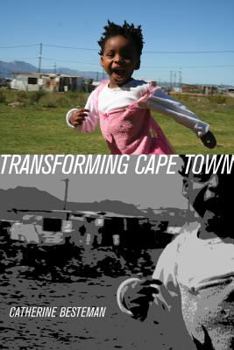Transforming Cape Town: Volume 19
Select Format
Select Condition 
Book Overview
This study provides a window into the lives of ordinary South Africans more than ten years after the end of apartheid, with the promises of the democracy movement remaining largely unfulfilled. Catherine Besteman explores the emotional and personal aspects of the transition to black majority rule by homing in on intimate questions of love, family, and community and capturing the complex, sometimes contradictory voices of a wide variety of Capetonians. Her evaluation of the physical and psychic costs to individuals involved in working for social change is grounded in the experiences of the participants and illu-minates two overarching dimensions of life in Cape Town: the aggregate forces determined to maintain the apartheid-era status quo, and the grassroots efforts to effect social change.
Format:Paperback
Language:English
ISBN:0520256719
ISBN13:9780520256712
Release Date:September 2008
Publisher:University of California Press
Length:312 Pages
Weight:0.45 lbs.
Dimensions:0.7" x 6.1" x 9.0"
Customer Reviews
1 rating
good detail, needs more organization
Published by Thriftbooks.com User , 15 years ago
I used this ethnography for a 200 level anthropology course taught to a general audience. The book is rich in detail, but not organized as clearly or smoothly as it could/should be. Besteman's reflections on the anthropological process, and her own hesitations and development as an anthropologist were very useful in the context of our class. She left students wishing anthropologists could have the prominence of politicians in setting social policy, clearly a message she would hope students might carry away. One African American student who had spent a month in South Africa himself liked the book, and the way it discussed Americans in SA. I found myself wishing for less jumping around in the book, and more ethnographic detail about the three organizations she profiles BRIEFLY at the end of the book. I'm glad I read it, glad I taught it this semester, but unsure if I will use it again.






